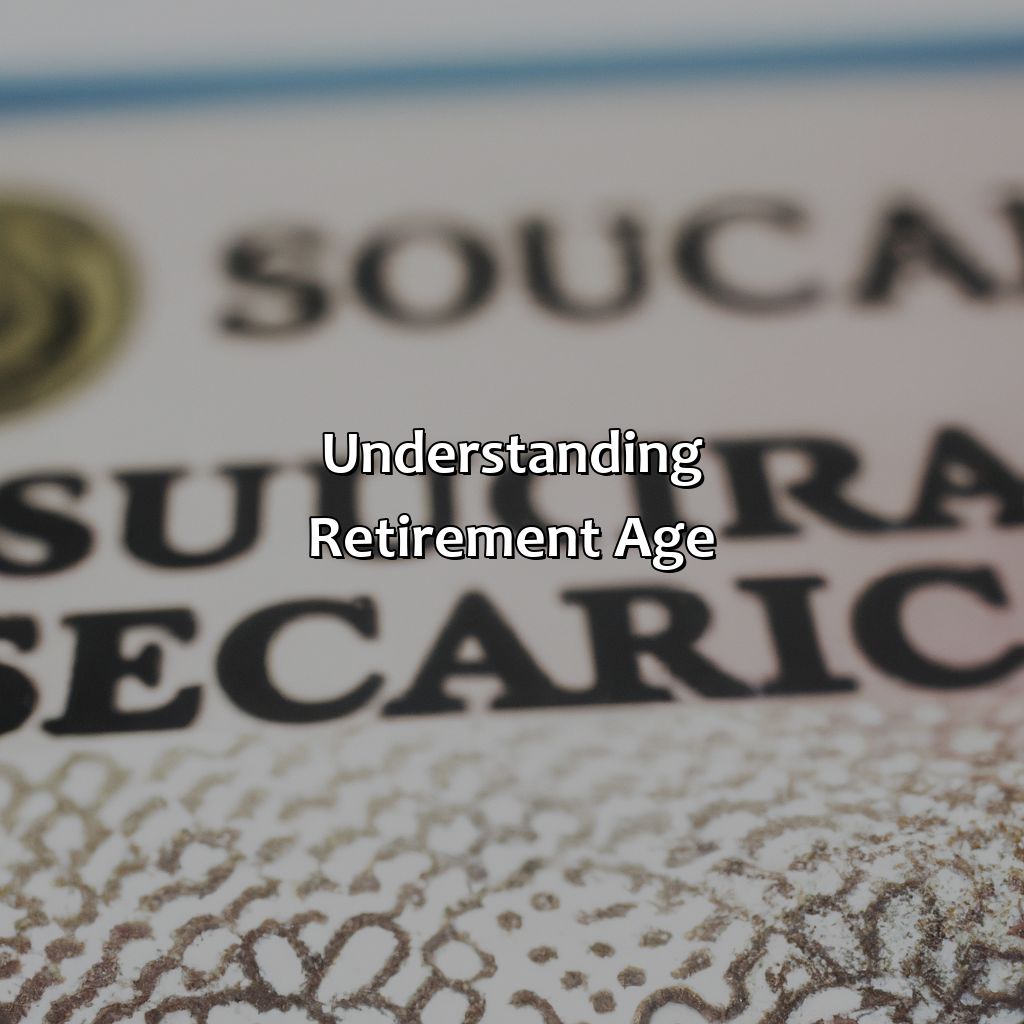What Does 66 And 2 Months Mean For Social Security?
Key Takeaway:
- Social Security is a government program that provides financial assistance to retired or disabled individuals, as well as their dependents and survivors.
- Full Retirement Age (FRA) is the age at which retirees can receive their full Social Security benefits. Early Retirement Age (ERA) is an option that allows individuals to start receiving benefits as early as age 62, but at a reduced rate.
- For those born between 1943 and 1954, FRA is 66 years old. Those born after 1954 have an FRA between 66 and 67 years old. Choosing to retire early at age 62 will result in a reduced benefit amount of up to 30% based on your FRA.
- It’s important to plan for retirement and Social Security benefits by calculating the amount of benefits you may receive and deciding when to begin receiving them.
You may have seen the term “66 and 2 months” thrown around when discussing Social Security. But do you know what it means and how it affects you? This article will explain why understanding this important concept is key to planning your retirement.
What is Social Security?
Social Security is a government-administered program that provides financial assistance to eligible citizens and residents. The program was established in 1935 as part of the New Deal to provide economic security for Americans during the Great Depression. It is funded through payroll taxes and primarily provides retirement benefits, disability insurance, and survivor benefits for dependents of deceased workers. Benefits are determined by a person’s work history and how much they have paid into the system. The program also includes Medicare, which provides medical coverage for seniors and individuals with disabilities.
As for “66 and 2 months,” it refers to the Full Retirement Age (FRA) for Social Security benefits. This is the age at which a person is eligible to receive their full retirement benefit, based on their lifetime earnings. For individuals born in 1955 or earlier, their FRA is 66 plus a certain number of months, depending on their birth date. Those born in 1960 or later will have an FRA of 67. However, individuals can choose to start receiving benefits as early as age 62, although the amount will be reduced based on the number of months before their FRA.
It is important for individuals to plan for their retirement and understand how Social Security benefits factor into their overall financial plan. According to a report by the Government Accountability Office, about half of households aged 55 and older have no retirement savings, making Social Security a critical source of income for many Americans.
A true fact: In 2020, over 64 million people received Social Security benefits, with retired workers accounting for 46 million of those recipients. (Source: The Social Security Administration)

Image credits: retiregenz.com by James Jones
Understanding Retirement Age
To figure out retirement age, you need to think about Social Security benefits. Know what your full retirement age is and what it means for Social Security. Plus, look at the pros and cons of early retirement age.

Image credits: retiregenz.com by Harry Woodhock
Full Retirement Age
Reaching the age of eligibility for benefits can be a crucial decision. The age at which a retiree is entitled to receive 100% of their benefit payments is known as the ‘Full Retirement Age’. The Full Retirement Age depends on when one was born and ranges from 66 to 67 years old for those born after 1943.
A retiree could elect to begin receiving reduced benefits as early as age 62 or defer receiving retirement benefits up until the age of 70. Waiting beyond full retirement age increases monthly payouts by approximately 8%.
It is prudent to assess personal finances, longevity, health status, availability of work options, and plans in retirement before deciding when to take Social Security benefits.
One useful suggestion is to consider continuing employment even past the Full Retirement Age. This will increase overall earnings before retiring and raises monthly payments earned by delaying Social Security payouts until ages between 66 and 70. Another helpful idea is to seek advice from a financial professional who can navigate complex decisions and lead retirees in making sound choices prior to claiming benefits.
Retiring early means you get to enjoy a life of leisure and worry about Social Security later, like a responsible adult.
Early Retirement Age
Retirement Age is a crucial milestone that determines when an individual can receive their Social Security benefits. It refers to the age at which a person can choose to start receiving retirement benefits. If someone retires before reaching full retirement age, their monthly benefit payments will be reduced.
Full retirement age varies depending on the year of birth, with the current range being between 66 and 67 years old. Individuals can choose to start taking early retirement as early as 62, but this will result in a permanent reduction in monthly payments.
One thing to note is that even if someone chooses to delay taking Social Security beyond their full retirement age, they will not receive any additional increase once they turn 70. It’s important to weigh all the options and factors before deciding when to take Social Security.
It is estimated that nearly half of retirees start collecting benefits early – often out of necessity rather than choice. According to AARP, around 40 percent of people claim Social Security at age 62, while just over a third wait until full retirement age.
Looks like you’ll have to wait a little longer for that ‘golden years’ retirement party – 66 and 2 months is the new RSVP for Social Security benefits.
How 66 and 2 Months Affects Your Social Security Benefits
Do you want to comprehend the effect of 66 and 2 Months on your social security advantages? Get familiar with the benefits you can access at full and early retirement age, and after full retirement age. This paragraph will emphasize each of these sub-sections. It is a way to help you recognize the importance of 66 and 2 Months on your social security earnings.

Image credits: retiregenz.com by Joel Jones
Benefits at Full Retirement Age
Benefits of Receiving Social Security at Full Retirement Age
Receiving social security benefits at full retirement age ensures that you receive your maximum benefit amount without any reductions or penalties. Here are some important points to understand about receiving social security benefits at your full retirement age:
- Full retirement age varies based on the year you were born
- You can continue working while receiving full retirement benefits
- Your spouse may also be eligible to receive benefits based on your work record
- You do not need to wait until full retirement age to receive benefits, but doing so may maximize your monthly payments
- Benefits before or after full retirement age are subject to reductions or increases
In addition, it’s important to note that full retirement age is not necessarily the same as your “normal” or “early” retirement age. Understanding the nuances of these different timelines can help you make informed decisions about when to start receiving social security benefits.
If you’re unsure about when to start receiving social security benefits, consider speaking with a financial advisor for guidance specific to your individual circumstances. Don’t miss out on potential benefits by waiting too long to take action. Retiring early may sound tempting, but your Social Security benefits may be as non-existent as your work schedule.
Benefits at Early Retirement Age
At the Age of Retirement, securing Social Security Benefits is crucial. Learn about the advantages of claiming early, including a boost to retirement income and increased financial security.
- Eligibility for benefits when claiming at Early Retirement Age
- How to claim Social Security Benefits before reaching Full Retirement age?
- Effect on future benefits if a person claims at an early age
- Advantages and disadvantages of Retirement at Early Age
Apart from the above points, it’s essential to understand that Delaying claiming your benefits might offer additional financial advantages.
Did you know that the amount paid out in Social Security Benefits in the year 2020 was over $1 trillion? This number shows how incredibly crucial social security funds are to people in their golden years.
Retirement isn’t about taking it easy, it’s about hitting snooze on your alarm and knowing you earned it.
Benefits After Full Retirement Age
After attaining the legal full retirement age, there are several benefits you can enjoy. The ‘Benefits After Reaching Full Retirement Age’ indicate what you can obtain after meeting the legal requirement.
- Increased Social Security Benefits – At full retirement age, your monthly checks from social security will increase; this is because you have paid more into your account over the years.
- No Minimum Income Limits – You can earn as much as you want once you reach the full retirement age without any significant reduction in your Social Security benefits.
- No Earnings Test Limitations – While receiving items like disability benefits or other work-related payouts may limit what someone else under a different scenario can earn, there are no such limitations after Full Retirement Age has been achieved.
Upon reaching full retirement age, it’s also important to note that direct deposit is an available option for receiving Social Security benefits.
Once past their Full Retirement Age (FRA) date, some individuals choose to delay taking their social security benefit until they are older than 68 years old and receive a higher amount.
To maximize one’s Social Security benefit, consider working at least 35 years before claiming it. This not only makes it easy to calculate your average indexed monthly earnings (AIME), but it also ensures that all of your earnings history counts toward social security’s lifetime earnings record.
Five Facts About What Does 66 and 2 Months Mean for Social Security:
66 and 2 months is the full retirement age for those born between 1955-1959. (Source: Social Security Administration)
If you claim Social Security benefits at 66 and 2 months, you will receive 100% of your primary insurance amount. (Source: Investopedia)
If you claim benefits before 66 and 2 months, your benefits will be reduced, and if you claim after, your benefits will be increased. (Source: AARP)
You can delay claiming Social Security until age 70 to receive a higher monthly benefit. (Source: Social Security Administration)
Social Security benefits are based on your highest 35 years of earnings, adjusted for inflation. (Source: The Motley Fool)
FAQs about What Does 66 And 2 Months Mean For Social Security?
What does 66 and 2 months mean for social security?
When referring to social security, 66 and 2 months means the full retirement age for people born in 1955. It is the age at which individuals can receive their full retirement benefits without any reduction due to early retirement.
Can I receive social security benefits before 66 and 2 months?
Yes, you can receive social security benefits as early as age 62. However, your benefits will be reduced if you choose to retire early before reaching the full retirement age of 66 and 2 months.
How is the reduction in social security benefits calculated if I retire early?
The reduction in social security benefits is calculated based on the number of months you retire early. For example, if you retire two years early at age 64, your benefits will be reduced by approximately 13.34%.
Can I receive social security benefits after 66 and 2 months?
Yes, you can delay receiving social security benefits after the full retirement age of 66 and 2 months. If you delay receiving benefits, your benefits will increase by a certain percentage each year until you reach age 70.
How is the increase in social security benefits calculated if I delay retirement?
The increase in social security benefits is calculated based on the number of months you delay retirement. For example, if you delay retirement for four years until age 70, your benefits will increase by approximately 32%.
Do I have to retire at 66 and 2 months to receive social security benefits?
No, you do not have to retire at the full retirement age of 66 and 2 months to receive social security benefits. You can choose to retire at any age between 62 and 70, but the amount of your benefits will vary based on the age at which you retire.
 Checkout this IRS Loophole
Checkout this IRS Loophole 
